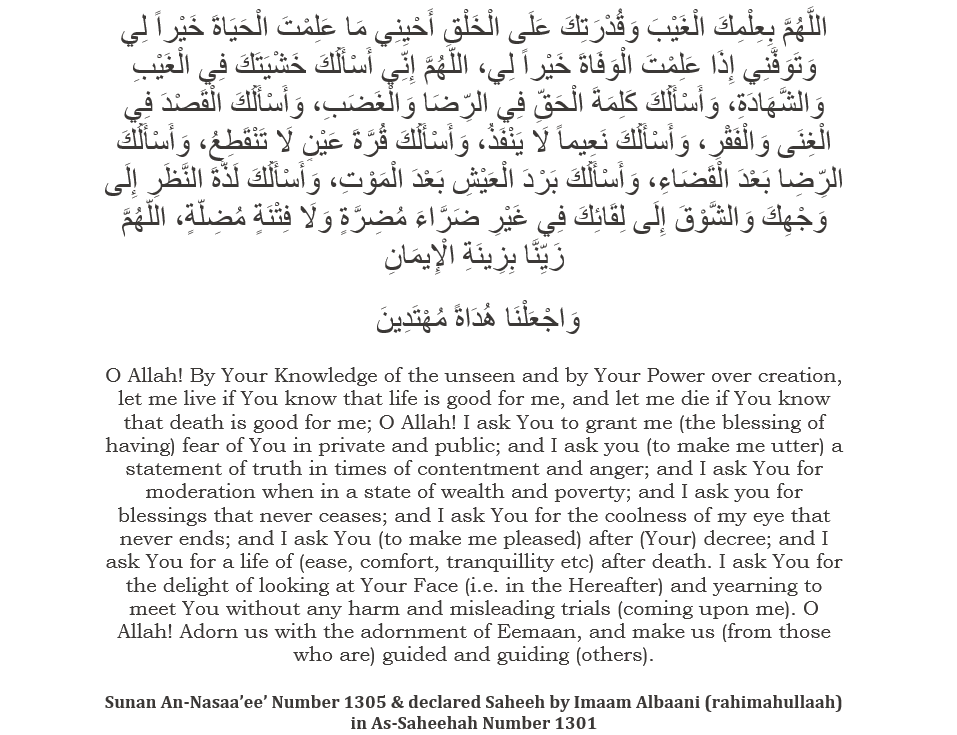In The Name of Allaah, The Most Merciful, The Bestower o Mercy.
A Tremendous Supplication That Gathers Issues of [Aqeedah, Worship and Manners] Said After The Tashahud and Before Tasleem
اللَّهُمَّ بِعِلْمِكَ الْغَيْبَ وَقُدْرَتِكَ عَلَى الْخَلْقِ أَحْيِنِي مَا عَلِمْتَ الْحَيَاةَ خَيْراً لِي وَتَوَفَّنِي إِذَا عَلِمْتَ الْوَفَاةَ خَيْراً لِي، اللَّهُمَّ إِنِّي أَسْأَلُكَ خَشْيَتَكَ فِي الْغَيْبِ وَالشَّهَادَةِ، وَأَسْأَلُكَ كَلِمَةَ الْحَقِّ فِي الرِّضَا وَالْغَضَبِ، وَأَسْأَلُكَ الْقَصْدَ فِي الْغِنَى وَالْفَقْرِ، وَأَسْأَلُكَ نَعِيماً لَا يَنْفَذُ، وَأَسْأَلُكَ قُرَّةَ عَيْنٍ لَا تَنْقَطِعُ، وَأَسْأَلُكَ الرِّضِا بَعْدَ الْقَضَاءِ، وَأَسْأَلُكَ بَرْدَ الْعَيْشِ بَعْدَ الْمَوْتِ، وَأَسْأَلُكَ لَذَّةَ النَّظَرِ إِلَى وَجْهِكَ وَالشَّوْقَ إِلَى لِقَائِكَ فِي غَيْرِ ضَرَّاءَ مُضِرَّةٍ وَلَا فِتْنَةٍ مُضِلَّةٍ، اللَّهُمَّ زَيِّنَّا بِزِينَةِ الْإِيمَانِ
وَاجْعَلْنَا هُدَاةً مُهْتَدِينَ
O Allah! By Your Knowledge of the unseen and by Your Power over creation, let me live if You know that life is good for me, and let me die if You know that death is good for me;
O Allah! I ask You to grant me (the blessing of having) fear of You in private and public;
And I ask you (to make me utter) a statement of truth in times of contentment and anger;
And I ask You for moderation when in a state of wealth and poverty;
And I ask you for blessings that never ceases;
And I ask You for the coolness of my eye that never ends;
And I ask You (to make me pleased) after (Your) decree;
Aand I ask You for a life of (ease, comfort, tranquillity etc) after death;
I ask You for the delight of looking at Your Face (i.e. in the Hereafter) and yearning to meet You without any harm and misleading trials (coming upon me);
O Allah! Adorn us with the adornment of Eemaan, and make us (from those who are) guided and guiding (others).
[Sunan An-Nasaa’ee’ Number 1305 & declared Saheeh by Imaam Albaani (rahimahullaah) in As-Saheehah Number 1301]
Beneficial Points From This Supplication By Shaikh Abdur Razzaaq Al-Badr [hafidhahullaah]
Regarding the statement:
اللَّهُمَّ بِعِلْمِكَ الْغَيْبَ وَقُدْرَتِكَ عَلَى الْخَلْقِ أَحْيِنِي مَا عَلِمْتَ الْحَيَاةَ خَيْراً لِي وَتَوَفَّنِي إِذَا عَلِمْتَ الْوَفَاةَ خَيْراً لِي
O Allah! By Your Knowledge of the unseen and by Your Power over creation, let me live if You know that life is good for me, and let me die if You know that death is good for me.
Commentary: This necessitates surrendering and submitting all of one’s affairs to the Lord- seeking from Allaah whatever is best for you in all circumstances and seeking that through His All-Encompassing Knowledge; for indeed Allaah knows all hidden and apparent affairs and He [alone] possess All-Encompassing Power over everything; neither can anyone amend his Judgement nor repel His Decree. And what is well known is that the servant does not know the end result of affairs and their final abode; and in addition to this, he is unable to obtain good and repel harm, except through that which Allaah grants him assistance and makes easy for him, so the servant remains completely [and always] in need of Allaah wherever he may be. And this why one says in this supplication: [ أَحْيِنِي مَا عَلِمْتَ الْحَيَاةَ خَيْراً لِي وَتَوَفَّنِي إِذَا عَلِمْتَ الْوَفَاةَ خَيْراً لِي – Let me live if You know that life is good for me, and let me die if You know that death is good for me].
This is why the [authentic] Sunnah forbids one from desiring death due to harm that befalls him, because he is ignorant of the consequences which [death might bring upon him in the afterlife]. The Prophet [sallal laahu alayhi wasallam] said, “Let none of you wish for death. If he is righteous, he might increase his good deeds. If he is sinful, he might repent”. [Bukhaari]
Regarding the statement:
اللَّهُمَّ إِنِّي أَسْأَلُكَ خَشْيَتَكَ فِي الْغَيْبِ وَالشَّهَادَةِ
O Allah! I ask You to grant me (the blessing of having) fear of You in private and public.
Commentary: That I fear you O Allaah in private and public; when I am with the people and when they are absent, for indeed there are people who fear Allaah in public and when seen, but the main and most important affair is to fear Allaah when not seen by the people. Indeed, Allaah praised those who fear him in the Ghayb. Allaah [The Most High] said: [ الَّذِينَ يَخْشَوْنَ رَبَّهُمْ بِالْغَيْبِ وَهُمْ مِنْ السَّاعَةِ مُشْفِقُونَ – Those who fear their Lord without seeing Him, while they are afraid of the Hour]. [Surah Al-Anbiyaa. Aayah 49]
Allaah [The Most High] said: [ مَنْ خَشِيَ الرَّحْمَنَ بِالْغَيْبِ وَجَاءَ بِقَلْبٍ مُنِيبٍ – Who feared the Most Beneficent (Allah) in the Ghaib (unseen): (i.e. in this worldly life before seeing and meeting Him), and brought a heart turned in repentance (to Him – and absolutely free from each and every kind of polytheism)]. [Surah Qaaf. Aayah 33]
And regarding the statement:
وَأَسْأَلُكَ كَلِمَةَ الْحَقِّ فِي الرِّضَا وَالْغَضَبِ
And I ask you (to make me utter) a statement of truth in times of contentment and anger.
Meaning: Enable me to speak the truth in times of contentment and anger. Speaking truth in times of anger is a noble and mighty affair, for indeed anger leads a person to say that which is opposite of truth and something other than justice. Indeed, Allaah praised his servants – those who pardon when angered and their anger does not lead them to transgression and aggression. Allaah [The Most High] said: [ وَإِذَا مَا غَضِبُوا هُمْ يَغْفِرُونَ – And when they are angry, they forgive]. [Soorah Ash-Shooraa. Aayah 37]
The one who does not utter- in times of anger- except the truth, then indeed this is proof regarding his strong Eemaan and that he has control over his soul’s [desires]. In a hadeeth the Prophet said, “The strong one [i.e. the one who is more worthy to be described as a strong person] is not the one who [overcomes the people in] wrestling, rather the strong person is the one who restrains his himself when angry”.
And regarding the statement:
وَأَسْأَلُكَ الْقَصْدَ فِي الْغِنَى وَالْفَقْرِ
And I ask You for moderation when in a state of wealth and poverty
Commentary: That I am balanced both when I am in a state of poverty and when I have wealth- upon the middle path ordained by the Islamic legislation, neither miserly when I am poor and fearing that what I have will run out nor being wasteful by placing upon myself that which I cannot bear, just as Allaah [The Most High] said:
[ وَلاَ تَجْعَلْ يَدَكَ مَغْلُولَةً إِلَى عُنُقِكَ وَلاَ تَبْسُطْهَا كُلَّ الْبَسْطِ فَتَقْعُدَ مَلُومًا مَحْسُورًا – And let not your hand be tied (like a miser) to your neck, nor stretch it forth to its utmost reach (like a spendthrift), so that you become blameworthy and in severe poverty]- [Surah Al-Israa. Aayah 29]. And that if one is wealthy, his wealth does not lead him to extravagance and he exceeds the limits. Allaah [The Most High] said:
وَالَّذِينَ إِذَا أَنفَقُوا لَمْ يُسْرِفُوا وَلَمْ يَقْتُرُوا وَكَانَ بَيْنَ ذَلِكَ قَوَامًا
And those, who, when they spend, are neither extravagant nor niggardly, but hold a medium (way) between those (extremes). [Surah Al-Furqaan. Aayah 67]
And regarding the statement:
وَأَسْأَلُكَ نَعِيماً لَا يَنْفَذُ
And I ask you for blessings that never ceases.
Commentary: Blessing that never ceases is the blessing of the Aakhirah, just as Allaah [The most high] said: [مَا عِنْدَكُمْ يَنفَدُ وَمَا عِنْدَ اللَّهِ بَاقٍ – Whatever is with you, will be exhausted, and whatever with Allah will remain]. [Surah An-Nahl. Aayah 96] And Allaah [The Most High] said: [ إِنَّ هَذَا لَرِزْقُنَا مَا لَهُ مِنْ نَفَادٍ – (It will be said to them)! Verily, this is Our Provision which will never finish]. [Surah Saad. Aayah 54]
And regarding the statement:
وَأَسْأَلُكَ قُرَّةَ عَيْنٍ لَا تَنْقَطِعُ
And I ask You for the coolness of my eye that will never end.
Commentary: There are blessings that cease and those that do not cease. The coolness of one’s eye in the Dunyah is a portion of something and the happiness related to it will come to an end. In addition to this, [this coolness of the eye in the Dunyah] is blemished with fear as a result of events that cause distress and suffering, as well as pain; therefore the eyes of the believer do not find a greater pleasure in anything of the Dunya, except love of Allaah, remembrance of Allaah and obedience to Allaah, just as the Messenger said, “The coolness [pleasure or delight] of my eyes is in prayer”. Therefore, whoever acquires the pleasure of his eyes in this [i.e. love of Allaah and obedience to Him], then he has that which will not come to an end in the Dunyah, the Barsakh and the Aakhirah.
And regarding the statement:
وَأَسْأَلُكَ الرِّضِا بَعْدَ الْقَضَاءِ
And I ask You (to make me pleased) after (Your) decree.
Commentary: Asking Allaah to make you pleased after His decree has come to pass, because that would truly manifest the reality of being pleased with Allaah’s decree.
And regarding the statement:
وَأَسْأَلُكَ بَرْدَ الْعَيْشِ بَعْدَ الْمَوْتِ
And I ask You for a life of (ease, comfort, tranquillity etc) after death.
Commentary: This shows that life, its [perfect] goodness and comfort only occurs after death, for indeed life before death is blemished with pain. And if there was no pain in this life other than death, then that would have been sufficient as pain, so how about the fact that life has numerous pains, grief, sicknesses, infirm old age, separation from beloved ones and other than that!
And regarding the statement:
وَأَسْأَلُكَ لَذَّةَ النَّظَرِ إِلَى وَجْهِكَ وَالشَّوْقَ إِلَى لِقَائِكَ فِي غَيْرِ ضَرَّاءَ مُضِرَّةٍ وَلَا فِتْنَةٍ مُضِلَّةٍ
And I ask You for the delight of looking at Your Face (i.e. in the Hereafter) and yearning to meet You without any harm and misleading trials (coming upon me).
Commentary: This section of the du’aa gathers the best of affairs in the Dunya and the Aakhirah – yearning to meet Allaah [in the Aakhirah whilst still living in this world] and seeing His Noble Face in the Afterlife [Free is He from all imperfections, co-equals, resemblance and partners]. And when it is the case that the complete accomplishment of this affair is based on safety from being harmed in this Dunya or being put to trial in one’s religious affairs, so one says: [فِي غَيْرِ ضَرَّاءَ مُضِرَّةٍ وَلَا فِتْنَةٍ مُضِلَّةٍ – without any harm and misleading trials (coming upon me)].
The believer seeing his lord on the day of judgement is an affair that has been narrated in numerous texts in the Qur’aan and [authentic] Sunnah, and none denies it except one who has strayed from the straight path; rather it is the loftiest bliss for the people of Jannah and the greatest joy. The Prophet [sallal laahu alayhi wasallam] said: When the people of Paradise would enter Paradise, Allaah [The Blessed and the Exalted] would ask: Do you wish Me to give you anything more? They would say: Have You not brightened our faces? Have You not made us enter Paradise and saved us from Fire? He [Allaah] would lift the veil, and of things given to them nothing would be dearer to them than looking at their Lord. [Saheeh Muslim 181]
We ask Allaah for his bounty.
And finally, regarding the statement:
اللَّهُمَّ زَيِّنَّا بِزِينَةِ الْإِيمَانِ وِاجْعَلْنَا هُدَاةً مُهْتَدِينَ
O Allah! Adorn us with the adornment of Eemaan, and make us (from those who are) guided and guiding (others).
Commentary: Beautification with Eemaan includes beautification of the heart with sound creed and noble deeds of the heart; beautification of the tongue with dhikr and recitation of the Qur’aan, enjoining good and forbidding evil and so forth; beautification of the limbs with righteous deeds and deeds that draws a person close to Allaah. [ وَاجْعَلْنَا هُدَاةً مُهْتَدِينَ – And make us (from those who are) guided and guiding (others)]- Meaning: That we ourselves become guided and guiding others. This is the greatest status when a person knows the truth and follows it, teaches others and guides them. We ask Allaah to guide us to this and include us amongst those who are guided and guiding others.
[Source: Fiqhul Adiyah Wal Adkaar. Vol 3. Pages 165-169. by Shaikh Abdur Razzaaq Al-Badr (hafidhahullaah). Slightly paraphrased]






